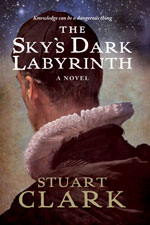
In the 1500s, Danish nobleman Tycho Brahe dismayed his wealthy family by taking an avid interest in mathematics, astronomy and all things fascinatingly planetary. A preternaturally gifted observer of the heavens before telescopes were refined and in common use, Tycho’s passions for geometry and celestial study were so intense that they led him at times to equally passionate disputes, one of which escalated into a duel during which he lost part of his nose. Tycho inspired and welcomed other mathematicians, scientists, astronomers and more to his estate, where guests participated equally enthusiastically in stargazing sessions and lively parties attended by Tycho’s court jester and his tame elk, who was a bit of a tippler. Johannes Kepler, a famed astronomer who is one of two protagonists in Stuart Clark’s vivid The Sky’s Dark Labyrinth, was inspired by Tycho’s observational prowess, though somewhat less enamoured of his lively banquets.
That Tycho leaps from the pages of The Sky’s Dark Labyrinth with such Falstaffian verve is testament to one of the great strengths of Clark’s imaginings of the lives and work of the great astronomers: strong character development that allows the reader to relate to the real people behind discoveries and revelations that for many are shrouded in the mists of history, if known at all. German mathematician and astronomer Kepler and his contemporary, Italian physicist and astronomer Galileo Galilei, are vibrant, fully rounded characters, complete with egos and frailties, balanced by passion and commitment in the face of personal challenges, political and religious roadblocks and often dire threats to their safety and life. The friends, family members, colleagues and adversaries who aid and abet Kepler and Galileo on their missions are all brightly etched, no matter how brief or extended their presences are in this absorbing historical fiction rendering of real lives.
Another great strength of The Sky’s Dark Labyrinth is that the book distills the technical complexities of what Kepler and Galileo struggled with, decoded and brought to light, all without dumbing down or compromising the immensity of their discoveries. With a PhD in astrophysics, and as a Fellow of the Royal Astronomical Society and a former Vice Chair of the Association of British Science Writers (1), Clark has the credentials to be both awe-inspiring in his knowledge, and potentially intimidating and obscure in how he conveys it. That he has taken that impressive pedigree and devoted it to science and astronomical journalism lays a foundation for The Sky’s Dark Labyrinth and its two planned follow-up novels (2) to be clear and accessible. That the book is also highly entertaining is a delightful surprise that also ameliorates how one retains the story’s technical underpinnings.
Clark also lays out the social, religious and political minefields into which Kepler and Galileo interjected their theories. That both astronomers were also men of their respective churches (Kepler was part of the burgeoning Lutheran church, Galileo was Roman Catholic) highlights the struggles of conscience they both faced to bring forth the fruits of their intellectual labours. One church official observes the fundamental constraint with which both astronomers had to contend with the mere suggestion that the Sun and not the Earth was the centre of the universe:
“We cannot go rearranging the heavens. God placed the orbs just as he placed each and every one of us in our correct stations. After our lifetime of faithful service, we receive our reward in Heaven. If we start rearranging the planets, what’s to stop people rearranging their lives? No one will know what to believe. There will be mass panic. Society will break down. What will prevent the peasants demanding land or riches? They could reject our authority altogether. … Even if these observations are correct, we must suppress them. There’s no sin in concealing a truth if it serves a higher purpose. The simple folk will not know how to interpret this.”
As Kepler later responds:
“Though it’s hard to believe at the moment, there must be harmony in the world; God’s perfection cannot allow it to be otherwise. It must be a harmony so grand that it reduces all earthly woes to triviality.”
As Clark so convincingly captures Kepler and Galileo as forthright but very human individuals simply striving for and wishing to share knowledge, so their struggles to convey that knowledge in the face of such at times monolithic resistance, opposition and threat is that much more moving. The reader most assuredly will come away from The Sky’s Dark Labyrinth with eyes more widely opened and perhaps gazing to the heavens with refreshed curiosity, respect and awe
Thank you to Polygon, Ruth Seeley and the author for providing a review copy of The Sky’s Dark Labyrinth, by Stuart Clark.
Notes
1. Stuart Clark’s Universe – www.stuartclark.com/
2. Volume II, The Sensorium of God, features Isaac Newton and Edmond Halley. Volume III, The Day Without Yesterday, recounts the story of Albert Einstein, Edwin Hubble and George Lemaitre.
See also:
Skeptically Speaking – Science as Fiction – a podcast in which, by the way, the interviewer also expresses her admiration for the lively Tycho!
